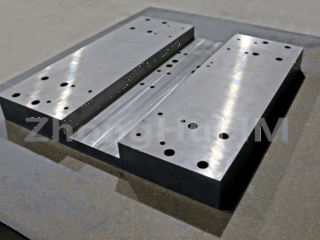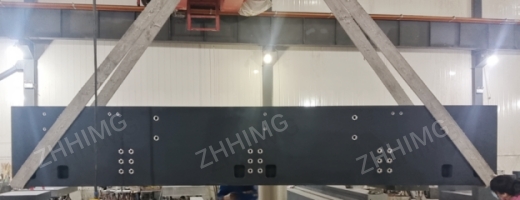In the field of precision measurement, the profilometer is the core equipment for obtaining high-precision data, and the base, as a key component of the profilometer, its ability to resist electromagnetic interference directly affects the accuracy of the measurement results. Among the various base materials, granite and cast iron are relatively common choices. Compared with cast iron profilometer bases, granite profilometer bases have shown significant advantages in eliminating electromagnetic interference and have become an ideal choice for high-precision measurements.
The influence of electromagnetic interference on the measurement of profilometers
In the modern industrial environment, electromagnetic interference is everywhere. From the electromagnetic radiation generated by large equipment operating in the workshop to the signal interference from surrounding electronic devices, once these interference signals affect the profilometer, they will cause deviations and fluctuations in the measurement data, and even lead to misjudgment of the measurement system. For contour measurement that requires precision at the micrometer or even nanometer level, even weak electromagnetic interference may cause the measurement results to lose reliability, thereby affecting product quality and production efficiency.

The electromagnetic interference problem of the cast iron profilometer base
Cast iron is a traditional material for manufacturing bases and is widely used due to its relatively low cost and mature casting process. However, cast iron has good electrical conductivity, which makes it vulnerable to electromagnetic induction in an electromagnetic environment. When the electromagnetic field emitted by the external electromagnetic interference source acts on the cast iron base, an induced current will be generated inside the base, forming an electromagnetic eddy current. These electromagnetic eddy currents not only generate secondary electromagnetic fields, interfering with the measurement signals of the profilometer, but also cause the base to heat up, resulting in thermal deformation and further affecting the measurement accuracy. In addition, the structure of cast iron is relatively loose and cannot effectively shield electromagnetic signals, allowing electromagnetic interference to easily penetrate the base and cause interference to the internal measurement circuits.
The electromagnetic interference elimination advantage of the granite profilometer base
Natural insulating properties
Granite is a kind of natural stone. Its internal mineral crystals are closely crystallizated and the structure is dense. It is a good insulator. Unlike cast iron, granite is almost non-conductive, which means it will not generate electromagnetic eddy currents in an electromagnetic environment, fundamentally avoiding the interference problems caused by electromagnetic induction. When the external electromagnetic field acts on the granite base, due to its insulating properties, the electromagnetic field cannot form a loop inside the base, thereby greatly reducing the interference to the profilometer measurement system.
Excellent shielding performance
The dense structure of granite endows it with a certain electromagnetic shielding capability. Although granite cannot completely block electromagnetic signals like metal shielding materials, it can scatter and absorb electromagnetic signals through its own structure, thereby weakening the intensity of electromagnetic interference. In addition, in practical applications, the granite profilometer base can also be combined with dedicated electromagnetic shielding designs, such as adding a metal shielding layer, etc., to further enhance its electromagnetic shielding effect and provide a more stable working environment for the measurement system.
Stable physical properties
In addition to directly eliminating electromagnetic interference, the stable physical properties of granite also indirectly contribute to enhancing the anti-interference ability of the profilometer. Granite has an extremely low coefficient of thermal expansion and hardly undergoes dimensional deformation when the temperature changes. This means that in cases where electromagnetic interference may cause local temperature changes, the granite base can still maintain a stable shape and size, ensuring the accuracy of the measurement reference and avoiding additional measurement errors introduced due to base deformation.
Today, in the pursuit of high-precision measurement, granite profilometer bases, with their natural insulation properties, excellent shielding performance and stable physical properties, are significantly superior to cast iron profilometer bases in eliminating electromagnetic interference. Choosing a profilometer with a granite base can maintain stable and accurate measurement in complex electromagnetic environments, providing reliable measurement guarantees for industries with extremely high precision requirements such as electronic manufacturing, precision mechanical processing, and aerospace, and helping enterprises improve product quality and competitiveness.
Post time: May-12-2025

